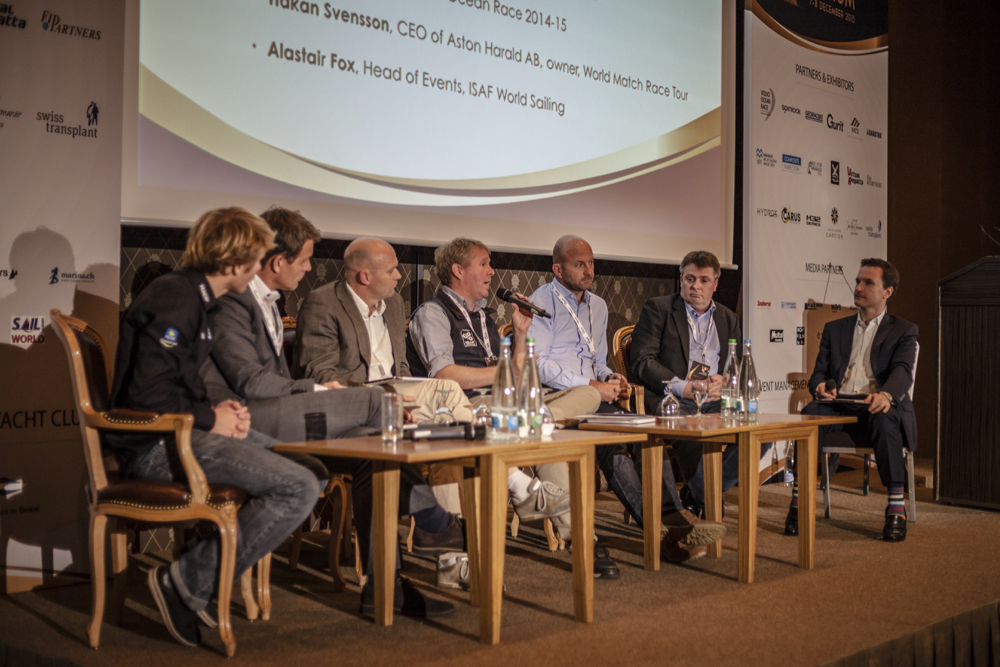The Yacht Racing Forum in Geneva brought together 263 delegates to discuss the future of the sport and exchange best practice. Many hot topics were discussed, including the future of the sports governing body World Sailing, how to increase participation at grass roots level, sustainability issues, foiling, safety and how to build the commercial appeal of sailing at the top level.
263 key players from within the yacht racing industry spent two days in Geneva at the Yacht Racing Forum discussing the future of the sport, doing business and exchanging best practice.
The conference saw some inspiring presentations from many big names such as Vendée Globe winner Francois Gabart talking about his plans to race Macif, his 100ft Ultime multihull non-stop singlehanded around the world to Ian Walker, whose Volvo Ocean Races around the planet have opened his eyes to the importance of environmental sustainability, one of the discussion topics in the Forum. Knut Frostad said sailing should stop trying to be a ‘Red Bull’ sport and focus on its other strengths. “If there is one thing that sailing does better than anything, football or any other sport, it’s corporate hospitality. You can engage big decision makers more effectively, and for much longer, than any other sport is able to, and we should make the most of that.”
On day one, there were three separate conference streams: Business and Marketing, Design & Technology, and Risk Management & Safety.
In Business and Marketing, Vice President of World Sailing Gary Jobson looked forward to much closer integration between sailing’s governing body and other branches of the sport. To emphasis this shift in focus, to a much more all-encompassing overview of sailing, Jobson also took the opportunity of the Forum to formally announce that the International Sailing Federation will from now on be known as World Sailing.
Ian Walker, winner of the Volvo Ocean Race, said the two days of discussion had changed his view about the sport. “Maybe we don’t need to worry so much about fragmentation in the sport,” he said. “Following World Sailing’s presentations I have changed my mind and now think maybe it’s a good thing for the sport. ”
Mark Turner from OC Sport, agreed that we should celebrate the diversity of sailing, but that we still need to lay out a clearer pathway through the sport, one that makes it easier to understand for potential participants and also to potential commercial partners. “If we just focused on growing the participation in sailing of women, and of emerging nations, we would create massive growth in the sport around the world.”
In the Risk Management and Safety conference, the group discussed ways of mitigating risk and reassuring potential sponsors by identifying, understanding and anticipating risks.
The Design & Technology Symposium convened in its 7th edition with a day of six in-depth discussions among experts from a wide variety of fields that all contribute to yacht performance. Moderated by Seahorse Magazine’s Dobbs Davis, the Symposium is an important adjunct event to the business of the sport by defining how the boats themselves can deliver the same excitement that energizes all those who participate in the game.
Foiling technology is being seen to penetrate the sport in ways unimaginable just three years ago. More and more boats, both monohull and multihull, are sprouting foils, so attendees learned how they work, why they work, what performance gains they make, and how they can be controlled on boats as varied as AC 72’s, C-Class cats and the latest generation IMOCA 60’s.
Advances in composite structures have progressed to where precise engineering is needed to optimize design. So the results from a lengthy and thorough study commissioned for the Volvo 65’s was revealed that measured static and dynamic loads throughout the race – this will provide a valuable dataset to help provide important calibration tools for designers, builders, engineers and even classification societies who wish to establish the acceptable structural standards for these designs.
Other subjects also included sustainability solutions for composite construction and methods suggested to mitigate their effects, software integration tools and much more.
The last session of the day focused on the joint efforts being made by designers and rating rule systems to create boats that are fast, fun and safe to race.
Picture: © Gilles Morelle/MaxComm Communication
Yacht Racing Forum speakers François Gabart, Knut Frostad, Mark Turner, Alastair Fox, Ian Walker, Håkan Svensson, Alec Wilkinson
